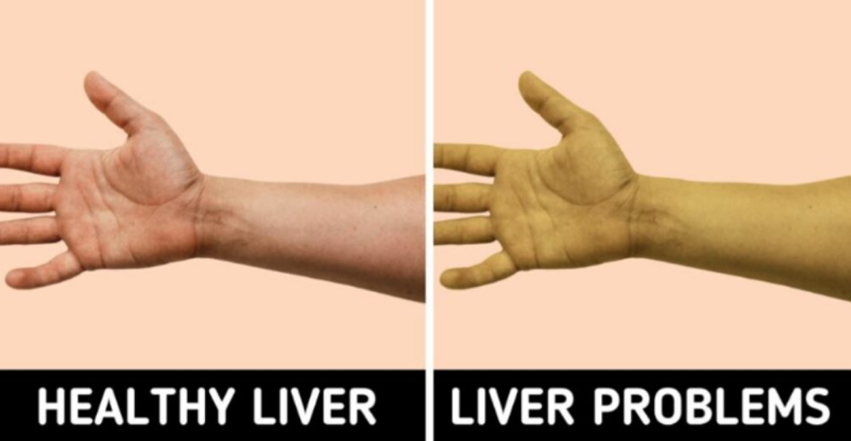Understanding your body is crucial for maintaining your overall health. While many symptoms can seem minor, they may signal underlying health issues that need attention. In this article, we will explore eight body symptoms that you should be aware of, including yellowing skin and white dots on your nails. By recognizing these signs early, you can take proactive steps to address any potential health concerns.

1. Yellowing of the Skin
One of the most noticeable symptoms you might encounter is yellowing of the skin, also known as jaundice. This condition occurs when there is an excess of bilirubin, a yellow pigment produced during the breakdown of red blood cells, in the bloodstream.
Possible Causes
- Liver Disease: Conditions like hepatitis or cirrhosis can impair the liver’s ability to process bilirubin.
- Gallbladder Issues: Gallstones or inflammation can block the bile ducts, leading to a buildup of bilirubin.
- Hemolytic Anemia: This condition causes rapid breakdown of red blood cells, increasing bilirubin levels.
When to Seek Help
If you notice yellowing of your skin, it’s essential to consult a healthcare professional. They can perform tests to determine the underlying cause and recommend appropriate treatment. Early intervention can help prevent more serious health issues down the line.
2. White Dots on Nails
If you’ve noticed white dots or spots on your nails, you might be wondering what they mean. These white spots, known as leukonychia, are often harmless but can sometimes indicate an underlying health issue.
Possible Causes
- Trauma: Minor injuries to the nail matrix can cause white spots to appear as the nail grows.
- Allergic Reactions: Allergies to nail products can result in discoloration.
- Nutritional Deficiencies: Lack of certain nutrients, such as zinc or protein, can lead to white spots on the nails.
When to Seek Help
If the white spots persist or are accompanied by other symptoms, such as changes in nail texture or color, consult a healthcare provider for a thorough evaluation.
3. Unexplained Weight Loss
Losing weight without trying can be alarming, and it’s crucial to pay attention to this symptom. Unexplained weight loss can indicate a variety of health issues.
Possible Causes
- Hyperthyroidism: An overactive thyroid can speed up metabolism, leading to weight loss.
- Diabetes: Uncontrolled blood sugar levels can result in significant weight loss.
- Cancer: Various cancers can cause weight loss due to metabolic changes or loss of appetite.
When to Seek Help
If you experience significant weight loss (more than 5% of your body weight) over six months without any effort to lose weight, it’s essential to consult a healthcare professional for further investigation.
4. Frequent Fatigue
Feeling tired occasionally is normal, but persistent fatigue can be a sign of an underlying health issue.
Possible Causes
- Anemia: Low red blood cell count can result in fatigue and weakness.
- Sleep Disorders: Conditions like sleep apnea can disrupt sleep and lead to daytime tiredness.
- Chronic Fatigue Syndrome: This condition causes extreme fatigue that doesn’t improve with rest.
When to Seek Help
If you’re experiencing unexplained fatigue that doesn’t improve with rest, consider discussing your symptoms with a healthcare provider. They can help identify any underlying causes and recommend appropriate treatments.
5. Sudden Changes in Vision
Any sudden changes in vision should not be taken lightly. These changes can range from blurred vision to sudden loss of vision in one or both eyes.
Possible Causes
- Migraine: Visual disturbances can occur as a symptom of a migraine.
- Retinal Detachment: This serious condition can cause sudden vision loss and requires immediate medical attention.
- Glaucoma: Increased pressure in the eye can lead to vision changes over time.
When to Seek Help
If you experience sudden changes in vision, especially if accompanied by pain or other symptoms, seek medical attention immediately. Early diagnosis and treatment can help prevent permanent vision loss.
6. Persistent Cough

A persistent cough that lasts longer than a few weeks may be a symptom of an underlying health condition.
Possible Causes
- Infections: Chronic bronchitis or pneumonia can cause a lasting cough.
- Allergies or Asthma: These conditions can lead to inflammation in the airways, resulting in coughing.
- Gastroesophageal Reflux Disease (GERD): Stomach acid can irritate the throat, causing a chronic cough.
When to Seek Help
If you have a cough that lasts longer than three weeks or is accompanied by other symptoms such as shortness of breath, chest pain, or coughing up blood, consult a healthcare provider for further evaluation.
7. Persistent Headaches
While headaches are common and often benign, persistent or severe headaches can signal an underlying issue.
Possible Causes
- Migraines: These severe headaches can cause debilitating pain, often accompanied by nausea and sensitivity to light.
- Tension Headaches: Stress and tension can lead to recurring headaches.
- Sinusitis: Inflammation of the sinuses can cause pressure and pain in the head.
When to Seek Help
If you experience frequent or severe headaches that interfere with daily activities or are accompanied by other concerning symptoms, seek medical attention. A healthcare provider can help determine the cause and recommend appropriate treatment.
8. Changes in Bowel Habits
Changes in bowel habits, such as diarrhea, constipation, or blood in the stool, can indicate gastrointestinal issues that need attention.
Possible Causes
- Irritable Bowel Syndrome (IBS): This common disorder can cause alternating periods of diarrhea and constipation.
- Infections: Bacterial or viral infections can lead to diarrhea or changes in bowel habits.
- Inflammatory Bowel Disease (IBD): Conditions like Crohn’s disease or ulcerative colitis can cause significant changes in bowel habits and may require medical intervention.
When to Seek Help
If you notice persistent changes in bowel habits or experience symptoms such as abdominal pain, rectal bleeding, or unexplained weight loss, it’s important to consult a healthcare provider for evaluation.
